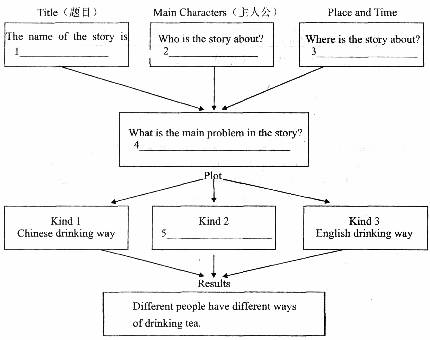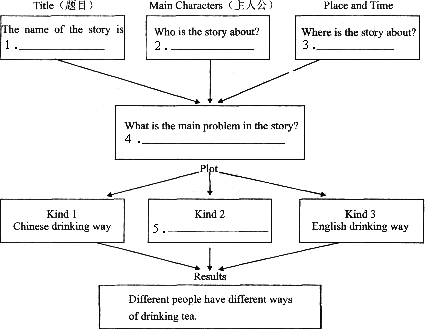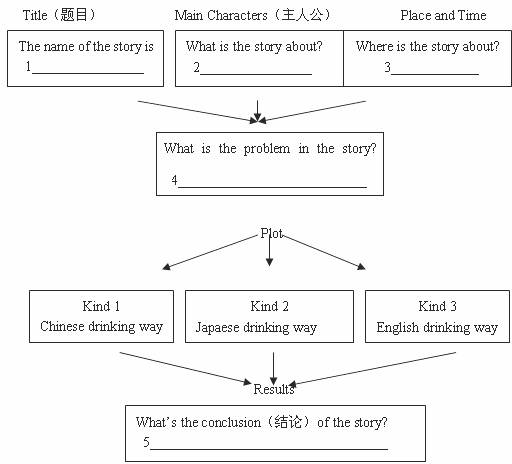
How to drink tea
All around the world,people drink tea.But tea does not mean the same thing to everyone.
In China,for example,tea is always served(招待)when people get together.The Chinese drink
it at any time of day at homes or in teahouse.They prefer their tea plain,with nothing else in it.
Tea is also important in Japan.The Japanese have a special(特別的)way of serving tea called a tea ceremony(儀式).It is very old and full of meaning.Everything must be done in a special way in the ceremony.There is even a special room for it in Japanese homes.
Another tea—drinking country is England.In England,the late afternoon is ‘‘tea time”.Almost everyone has a cup of tea then.The English usually make tea in tea-port and drink it with cream and sugar.They also eat cakes,cookies and little sandwiches at teatime.
Different people have different ways of drinking tea.

科目:初中英語 來源:2009年遼寧省錦州市中考英語試題 題型:051
根據短文內容完成文后的圖表。
How to drink teaAll around the world, people drink tea.But tea does not mean the same thing to everyone.
In China, for example, tea is always served(招待)when people get together.The Chinese drink it at any time of day at homes or in teahouse.They prefer their tea plain, with nothing else in it.
Tea is also important in Japan.The Japanese have a special(特別的)way of serving tea called a tea ceremony(儀式).It is very old and full of meaning.Everything must be done in a special way in the ceremony.There is even a special room for it in Japanese homes.
Another tea-drinking country is England.In England, the late afternoon is ‘‘tea time”.Almost everyone has a cup of tea then.The English usually make tea in tea-port and drink it with cream and sugar.They also eat cakes, cookies and little sandwiches at teatime.
Different people have different ways of drinking tea.

查看答案和解析>>
科目:初中英語 來源: 題型:
根據短文內容完成文后的圖表。
How to drink tea
All around the world, people drink tea.But tea does not mean the same thing to everyone.
In China, for example, tea is always served (招待)when people get together.The Chinese drink it at any time of day at homes or in teahouse.They prefer their tea plain, with nothing else in it.
Tea is also important in Japan.The Japanese have a special (特別的)way of serving tea called a tea ceremony (儀式).It is very old and full of meaning.Everything must be done in a special way in the ceremony.There is even a special room for it in Japanese homes.
Another tea-drinking country is England.In England, the late afternoon is “teatime”.Almost everyone has a cup of tea then.The English usually make tea in teaport and drink it with cream and sugar.They also eat cakes, cookies and little sandwishes at teatime.
Different people have different ways of drinking tea.

查看答案和解析>>
科目:初中英語 來源:同步題 題型:閱讀理解
查看答案和解析>>
科目:初中英語 來源: 題型:閱讀理解
Thank for your message. Yes, I’m having a great time 1 my exchange in France .It’s even better than I thought it 2 . I was a bit 3 before I arrived here, but there was no reason to be. My host family is really nice. They go out of their way to make me 4 at home. And you 5 believe how quickly my French has improved! I’m very comfortable 6 French now 7 I still make lots of mistakes, it doesn’t bother me like it used to. My biggest challenge is learning 8 at the dinner table. 9 you can imagine, things are really 10 the way they are at home. For example, you’re not supposed to put your bread on your plate. You’re supposed to put it on the table! I thought that was pretty strange at first, but now I 11 it .You’re not supposed to eat anything with your hands 12 bread, not even fruit! (You have to cut it up and eat it with a fork.) 13 thing is that it is very rude to say you’re full. If you don’t want 14 food, you should just say, “It was delicious.” Also, it’s rude to put your hands in your lap. You should always keep your hands, but not your elbows, on the table. I find 15 difficult to remember everything, but I’m gradually getting used to things, and don’t find them so strange any more. I’ll write soon and tell you more about life in France. Hope you’re having a good school year.
1. A. at B. during C. in D. on
2. A. was B. would be C. would D. used to be
3. A. excited B. annoyed C. happy D. nervous
4. A. to feel B. feel C. to stay D. stay
5. A. wouldn’t B. won’t C. shouldn’t D. don’t
6. A. speaking B. to speak C. saying D. to say
7. A. Yet B. But C. Although D. Ever
8. A. how to eat B. how to drink C. how to say D. how to behave
9. A. Like B. As C. Just like D. Just what
10. A. different from B. different of C. different between D. different as
11. A. am get used to B. am used to C. get use to D. used to
12. A. except B. besides C. beside D. including
13. A. The other B. Other C. Another D. Another one
14. A. any more B. no more C. any D. no
15. A. it B. that C. this D. that’s
查看答案和解析>>
湖北省互聯網違法和不良信息舉報平臺 | 網上有害信息舉報專區 | 電信詐騙舉報專區 | 涉歷史虛無主義有害信息舉報專區 | 涉企侵權舉報專區
違法和不良信息舉報電話:027-86699610 舉報郵箱:58377363@163.com